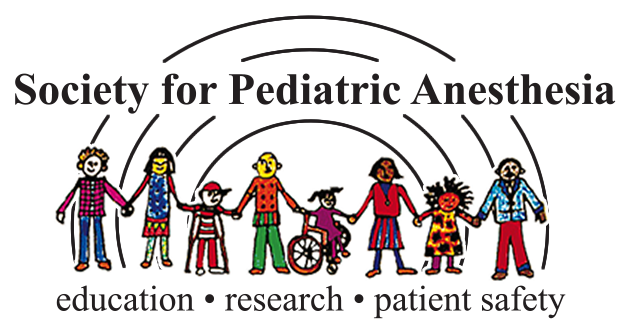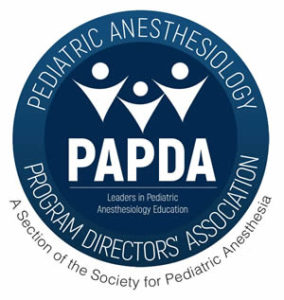Implementation of Faculty Development for Pediatric Anesthesia Fellowship
CME Task Force on Faculty Development for SPA
Dolores Njoku, Allison Kinder Ross, Jamie McElrath Schwartz
The goal of faculty development for our pediatric anesthesia fellows is to enhance their training with a curriculum that includes the transition to the next step of their career. This would include a combination of didactics, simulation experiences, and an increased opportunity for mentorship and coaching in their chosen areas. It is all about introduction and exposure of recommended topics to enrich the fellow’s personal and career growth beyond fellowship.
Much of what is presented in these recommendations includes use of the PAINTS Curriculum (Lecture IDs included) and on-line resources for the program directors. In addition to the didactics, certain processes could be made available to the fellow such as supervision, shadowing, mentorship and coaching.
Faculty Development for Specific Career Opportunities
THE CLINICIAN
- how to build clinical programs/becoming an attending
- PS-5 Protocols, Guidelines and Pathways
- PM-2 Business of Medicine: Management
- SV-1 Supervision
- SV-2 Procedural Supervision
- how to use quality and safety
- PS1 through PS-9
- QI-1 through QI-4
- team building
- PM-4 Leading and Working with Teams
- Other resources
- ASA POCUS Certificate Program
- Clinical opportunities in second half of year may be offered as possible depending on resources and manpower at each program
- Focus on clinical expertise of the interest of fellow
- Supervision of residents
- Shadow attending(s) to understand flow and responsibilities
THE EDUCATOR
- importance and right type of feedback
- SV-3 Evaluation and Feedback in Clinical Setting
- Principles of medical education
- ME-1 through ME-3
- Milestones resource for the clinician/educator
THE RESEARCHER/SCIENTIST
- basics of how to review papers
- RM-2 Research and authorship ethics
- RM-3 Ho to critically evaluate literature, etc…
- basics on how to write papers
- RM-7 How to write an abstract
- How to write/submit a manuscript
- basics of the grant process
- From the NIH
- understanding the mentor/mentee relationship
- From Harvard TH Chan School of Public Health
- process in place (per other task force group) for research mentorship including committee
THE ADMINISTRATOR/LEADER
- exposure to leadership programs (see below under Leadership)
- role of an advanced degree
- the process of promotion (institution dependent)
- finances for programs (profit/loss/budgets)
- PM-1 through PM-3
- Leadership
- LS-1 through LS-4 Leadership (overview)
- Emotional intelligence and perioperative teams (simulation opportunity)
- Team building
- PM-4
- Difficult conversations
- LS-2 Conflict Management and Resolution
- Other resources
- ASA Leadership and Executive Development options
- ASA Leadership Academy
PROFESSIONALISM
- PM-6 Professionalism (AKR giving lecture)
- CS-1 Active Listening (AKR giving lecture)
- Resources
- Reporting mechanisms
- Individualized to program
Additional recommendations:
- Assign each fellow a mentor (ACGME requirement) and/or coach
- May come from other institutions, other departments (dependent upon individual program and conversations/collaboration—not required, but desirable)
- Resources
- WELI (currently for junior faculty after 3 years in practice)
- AUA Mentoring Program https://auahq.org/aua-mentoring-program/ (currently for junior faculty)
- Develop a spreadsheet with the institutions, their strengths, opportunities to share
- Others (SOAP, others)***
- Bootcamps
- Allow for networking and to interface with fellows from other institutions
- May be in person or on Zoom (more inclusive)
- Experts from academics, small and large hospitals, freestanding children’s hospitals, children’s hospitals within adult hospitals, private practice
- Resources
- An Advanced Boot Camp for Pediatric Anesthesiology Fellows.
Patel SM, Singh D, Hunsberger JB, Lockman JL, Taneja PA, Gurnaney HG, Corridore M, Ambardekar AP, Borzova VV, Vecchione TM, Lockhart TJ, Lim DJ, Shay JE, Black SA, Njoku DB.
J Educ Perioper Med. 2020 Apr 1;22(2):E641. doi: 10.46374/volxxii-issue2-njoku. eCollection 2020 Apr-Jun.
PMID: 32964069 Free PMC article.
- Pediatric anesthesiology fellow education: is a simulation-based boot camp feasible and valuable?
Ambardekar AP, Singh D, Lockman JL, Rodgers DL, Hales RL, Gurnaney HG, Nathan A, Deutsch ES.
Paediatr Anaesth. 2016 May;26(5):481-7. doi: 10.1111/pan.12865. Epub 2016 Mar 7. PMID: 26948074
- An Advanced Boot Camp for Pediatric Anesthesiology Fellows.
- Allow for networking and to interface with fellows from other institutions

